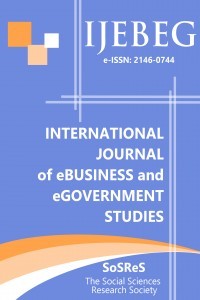DEVELOPING AN E-GOVERNMENT EDUCATION PROGRAMME CURRICULUM BASED ON KNOWLEDGE MANAGEMENT PARADIGMS TO SUPPORT INSTITUTIONAL TRANSFORMATION
DEVELOPING AN E-GOVERNMENT EDUCATION PROGRAMME CURRICULUM BASED ON KNOWLEDGE MANAGEMENT PARADIGMS TO SUPPORT INSTITUTIONAL TRANSFORMATION
The recent developments in e-government increasingly emphasize the need for change and transformation in public institutions. Thus the improvement of human capacity and thus educational initiatives are also becoming increasingly important. Accordingly, this paper aims to propose an e-government education programme curriculum that is based on knowledge management paradigms for supporting transformation in public institutions. Representing academic, government and practitioner perspectives all together, we think such proposal can bridge theory and reality, and contribute to the transfer and application of educational learning into real practice. A knowledge management approach plays a key role for such bridging of theory and practice, especially for the purpose of changing the reality. The framework of knowledge management paradigms is provided as the academic base upon which our discussion on knowledge management (education) and e-government development is furthered, and our proposal on an e-government education modeling and sample curriculum is grounded. A knowledge management and e-municipality seminar to be delivered to municipality staff, as well as an e-government and knowledge-management transformation course to be delivered to graduate university students are provided as specific suggestions for public institutions
___
- Balc=, A. & Kirilmaz, H. 2009. “Kamu Yönetiminde Yeniden Yapilanma Kapsaminda E
- Devlet Uygulamalari.” Türk @dare Dergisi Bengshir, T. K. (2009) “Human Capacity Development in e-Government” eGovShare
- Conference. Antalya, Turkey. December, 2009. http://edem.egovshare2009.org/presentations/egovshare2009_8_12_2009/egovshare2009_tbe nsghir.pdf
- Blewett, T.J., Keim, A., Leser, J. and Jones, L. (2008) “Defining a Transformational
- Education Model for the Engaged University” Journal of Extension. Volume 46, Number 3 http://www.joe.org/joe/2008june/comm1.php
- Cang=zbay, Kadir (2000), Komprador Rejimin Anatomisi, Özgür Üniversite Kitapl=G=, (2. Bask=), Ankara.
- Lee, J. & K. Layne (2001) “Developing fully functional E- government: A four Stage model”, Elsevier, Government Information Quarterly, Vol 18, 122-136.
- Medeni & AktaM (forthcoming) Veri Toplumundan Bilgi Toplumuna Dört Düzeyli Bir Toplum Modeli”, AG ve Bilgi GüvenliGi Sempozyumu 2010 (to be confirmed)
- Medeni, @.T., AktaM, Z. Tolun, M. (2009), “Bilgi Biliminin Mühendislik Gereksinimi ve Bilgi
- MühendisliGi” Elektrik Elektronik Bilgisayar Biyomedikal Mühendislikleri EGitimi 4. Ulusal Sempozyumu Nonaka, I. (1991). “Knowledge creating company”, Harvard Business Review, November- December, 96-104.
- SaGsan, M. (2009). “Knowledge Management Discipline: Test for an Undergraduate Program in Turkey”, Proceedings of the 6th International Conference on Intellectual Capital,
- Knowledge Management and Organizational Learning, School of Information Studies, McGill University, Montreal, Canada, 1-2 October, 2009: 237-244 pp.
- Saito, A., Medeni, T., Machado, M. & Umemoto, K. “Knowledge Management Education: A Framework Towards the Development of a Comprehensive Degree Program” in KSS 2004, November, Japan
- Yaz=c=, A. (forthcoming) “Teaching and Research on e-Government” ICEGEG 2010 APPENDIX
- Editor’s collection of e-Government Documentary by TRT (to be confirmed). REFERENCE MATERIALS: • Becerra-Fernandez, et al. , “Knowledge Management” (1/e) Prentice Hall, 2004 •
- E-Government-Gateway (www.turkiye.gov.tr) • V. Koschy “Action Research for Improving Practice: A Practical Guide”, London: Paul Chapman Publishing 2005 •
- D.A. Schön “The Reflective Practitioner: How Professionals Think in Action”, San Francisco: Jossey-Bass 1983. COURSE CONDUCT:
- Başlangıç: 2009
- Yayıncı: Sosyal Bilimler Araştırmaları Derneği
